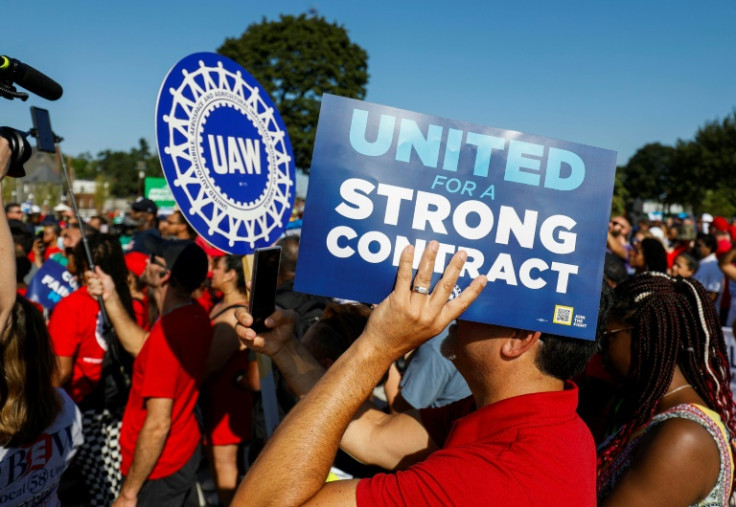US Auto Workers Strike, Posing Threat To Economy -- And Biden

Workers at the "Big Three" US auto manufacturers went on strike Friday in a first-ever coordinated action to demand pay raises, testing the resilience of the US economy and threatening President Joe Biden's 2024 re-election momentum.
A dramatic walkout -- observed outside a Detroit-area Ford plant with rowdy honking and cheers at the arrival of the United Auto Workers' leader -- followed a failed last-minute push by General Motors, Ford and Stellantis to produce an agreement before the deadline late Thursday.
This is a limited strike incorporating some 12,700 of the 150,000 workers represented by the UAW. However, the decision by the rival companies' employees to coordinate sent a powerful message in their battle for pay increases of 40 percent.
"Tonight, for the first time in our history, we will strike all three of the Big Three at once," UAW President Shawn Fain said in a webcast shortly before the strike took effect.
Fain said the union would strike at one plant at each company: a GM factory in Wentzville, Missouri; a Stellantis facility in Toledo, Ohio; and a Ford plant in Wayne, Michigan, but only the final assembly and paint operations.
The UAW said the strike could expand if demands are not met.
"They're starting it off right," said Rachel Judd, who joined the post-midnight rally in Wayne, Michigan in solidarity. Judd works at Ford's neighboring facility in Livonia.
"If negotiations don't keep moving forward, more plants will be added," she said.
Biden was to make public remarks on the strike at the White House, his press office said, without announcing a time.
The turmoil poses a direct threat to the Democrat, who often touts his support for unions and has made retooling the US manufacturing base for a high-tech future -- including a push for electric vehicles -- central to his presidency.
The powerful UAW has so far refrained from joining other leading unions in endorsing Biden.
On Thursday evening, Biden spoke by telephone with Fain and the heads of major automakers to discuss the ongoing negotiations.
Fain declined to comment on his conversation with Biden.
"I don't want to talk about politics," he said outside the Wayne plant early Friday. "This is about our members tonight."
Many hourly workers say the auto giants must produce significantly better packages to make up for what they call meager wages and benefit cuts after the 2008 financial crisis, when both GM and Chrysler, now part of Stellantis, underwent bankruptcy reorganizations.
All three companies have been highly profitable in recent years.
"This company has been making money off of us for years," said Paul Sievert, who has worked at Ford's Wayne plant for 29 years. "I think it's time that we got back."
UAW's demands include a 40-percent hike in wages, which Fain has said is needed to match rises in CEO pay.
Other sticking points include raising pay and benefits for junior employees to match the level of more seasoned workers, who currently make a top rate of around $32 an hour.
General Motors upped its offer Thursday, lifting a proposed wage increase to 20 percent. The company had previously proposed an 18 percent rise, according to the UAW.
In a statement Friday, GM said it would "continue to bargain in good faith with the union to reach an agreement as quickly as possible."
Ford officials have expressed disappointment at the UAW's stance. The 120-year-old Michigan company has more hourly workers than the other two companies and considers itself pro-union.
Sievert welcomed Ford's favorable posture towards unions but "they need to step up."
"Show us that, you know, you care about us and we care about you," he said.
In a statement, Senate Democratic Majority Leader Chuck Schumer, a key Biden ally, urged the car companies to "bargain in good faith to quickly reach a new contract that is fair to workers."
© Copyright IBTimes 2024. All rights reserved.





















